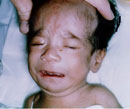| Minnesota Public Radio News Story | |||
|
South Dakota is said to have among the highest rate of babies born with fetal alcohol syndrome in the nation. Health officials say they don't have an accurate count of babies born with the preventable disability, but they know it's high, especially in rural areas. Fetal Alcohol Syndrome - FAS - has far-reaching implications for our schools and even court systems.
Adrian was 16-months-old when he came down with a high fever one January weekend. He was cutting teeth, so his parents made due with over-the-counter medication. By Monday he had a runny nose and a cough, and the doctor placed him in a Vermillion hospital with possible RSV, a respiratory virus. RSV is an extremely dangerous, but sadly common, virus for young children who are born prematurely and children with special heath problems. By Tuesday, he was placed in a Sioux Falls intensive-care unit where he stayed for 130 days. "He was breathing at a rate of almost 480 times a minute," recalls Alan Beeck, Adrian's father. "(They were) really small breaths to keep his lung tissue from disintegrating, because it was very fragile." Adrian, now 20 months old with dark curly hair, lies stiffly on his back, wearing only a diaper and socks. Eleven tubes have left his chest scarred, and he was given high doses of morphine, to which he became addicted. He nearly died several times. Adrian is the youngest of five born to a Native American woman, who abused alcohol and drugs during all of her pregnancies. Alan Beeck and his wife, Valere, adopted all five siblings. They all have special needs from learning disabilities, attention and hyperactivity disorders, to drug tremors and muscle loss. The extent of Adrian's disabilities are not yet known. In many ways, FAS is still a mystery disease, but one the government is spending millions of dollars on. It's estimated that states spend on average $1.5 million for each child with FAS. "We're already spending millions of dollars in support systems that aren't getting us any further ahead, because we aren't eliminating the problem, we're just Band-aiding the problem," says Judy Struck, the executive director of the South Dakota University Affiliated Program. Struck says because alcohol is so socially acceptable, the Fetal Alcohol Syndrome problem is more complex than just telling a pregnant woman not to drink. "There's so many complicating social issues involved in why people drink. Not all of them are alcoholics, but they consumed the right amount of alcohol at the right time during pregnancy that it has that effect on the child." Many women who drink while pregnant are less likely, says Struck, to seek pre-natal care. She says that can be because doctors are required to report any pregnant woman suspected of drinking to social services. Adrian Beeck's medical bills are approaching $1 million. Social service agencies from two states will pay some of that bill because he's adopted, and Children's Miracle Network is helping. But Alan and Valere Beeck will still be responsible for the outstanding medical bills for their child. Adrian's recovery is far from over. He's been at the Children's Care Hospital and School for Intense Rehabilitation. Because he was in the ICU for so long, his muscles became stiff. He has painful physical therapy sessions six times a day. Occupational therapist Linda Owell says Adrian needs to learn to move, all over again. "The first step is to really get his muscles working again and to get him loosened up and interested in playing," she says. "The actual playing part is going to be down the road quite a ways. He's not holding toys or even looking at toys at this point." Adrian is placed on his back on a large blue rubber ball. Simple child play is painful while Owell moves his arms so his fingers touch. But Adrian still has a toddler mentality. He closes his eyes whenever a therapist walks in the room; thinking if he can't see her, then she can't see him, and the session sure to come may be avoided. Adrian is expected to make a full recovery with another three months of therapy, but the extent of his Fetal Alcohol Syndrome won't be known for years. This fall it's hoped a new four-state consortium will help states start dealing better with cases like Adrian Beeck.
|
Source of this article
